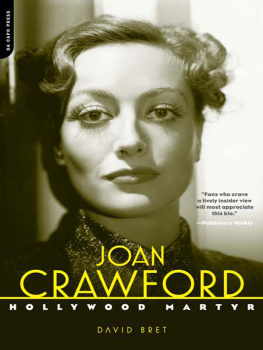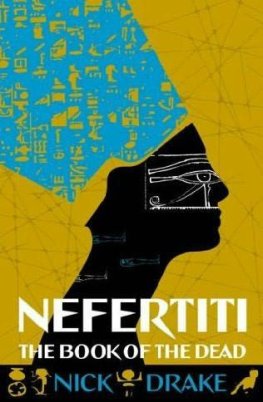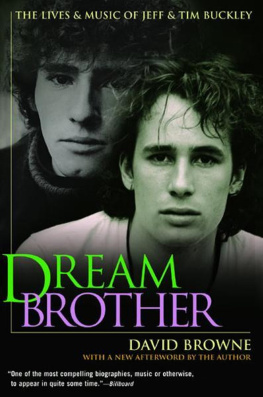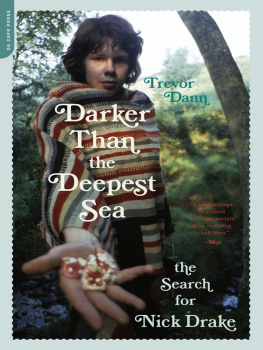Trailblazers
THE TRAGIC LIVES OF
GRAM PARSONS
NICK DRAKE &
JEFF BUCKLEY
DAVID BRET

First published in 2009
by JR Books, part of Aurum Press Ltd
7477 White Lion Street, London, N1 9PF
www.aurumpress.co.uk
This ebook edition first published in 2014
Copyright 2009, 2014 David Bret
David Bret has asserted his moral right to be identified as the Author of this Work in accordance with the Copyright Designs and Patents Act 1988.
All rights reserved
This ebook is copyright material and must not be copied, reproduced, transferred, distributed, leased, licensed or publicly performed or used in any way except as specifically permitted in writing by the publishers, as allowed under the terms and conditions under which it was purchased or as strictly permitted by applicable copyright law. Any unauthorised distribution or use of this text may be a direct infringement of the authors and publishers rights, and those responsible may be liable in law accordingly
First image in photos section: Corbis; all others Getty Images
eBook conversion by Quayside Publishing Group
Digital edition: 978-1-78131-342-8
Softcover edition: 978-1-90677-932-0
Contents
This book is for Michel Bidault, Les Enfants de Novembre, and for Barbara, the greatest auteur-compositeur-interprte who ever lived.
Noublie pas
La vie sans amis cest comme
un jardin sans fleurs
Acknowledgements
W riting this book would not have been possible had it not been for the inspiration, criticisms and love of that select group of individuals who, whether they be in this world or the next, I will always regard as my true family and autre coeur: Barbara, Irene Bevan, Marlene Dietrich, Ren Chevalier, Axel Dotti, Dorothy Squires and Roger Normand, que vous dormez en paix. Lucette Chevalier, Maria da F, Jacqueline Danno, Doris Day, Hlne Delavault, Tony Griffin, Betty and Grard Garmain, Annick Roux, John and Anne Taylor, Terry Sanderson, Charley Marouani, David & Sally Bolt. Also a very special mention for Amlia Rodrigues, Joey Stefano, those hiboux, fadistas and amis de foutre who happened along the way, and mes enfants perdus.
On behalf of Nick, my heart goes out to Michel, one of the few people on this Earth who genuinely made him happyand to M_for making Jeffs heart flutter that little bit faster. Thanks also to Mary, Brenda, Marianne, and to Emmylou for being there for Gram. To Joe Hayes and Jack Rhodes for the magnificent epitaph, Satisfied Mind.
Thanks too to Mikey Blatin, Theo Morgan, and the late Bruno Coqautrix.
And where would I be without Jeremy Robson and the munificent team at JR Books? Likewise my agent Guy Rose and his lovely wife, Alex? Also to my wife, Jeanne, for putting up with my bad moods and for still being the keeper of my soul.
And finally a grand chapeau bas to Gram, Nick and Jeff for having lived.
David Bret
Introduction
W orking on each of these three young men was akin to embarking on a personal crusade, or on a trio of discreet but ultimately doomed love affairs. Three young men: handsome, temperamental, sublimely giftedsent before their time, their lodestars burning all too briefly before being extinguished in mysterious but distressing circumstances. Three young men with much more in common than an early demise.
It is only in death that Gram Parsons, Nick Drake and Jeff Buckley have realised their true and full potential. Their strongest achievement, besides the beautiful music they made, is that posthumously they have influenced a whole host of so-called stars who now crowd the charts on both sides of the Atlanticnot one of which possesses a smidgeon of their innate talent and charisma. Yet we must be grateful for these latter day five-minute wonders for drawing a new generation of adherents to the Parsons-Drake-Buckley bannersin Grams and Nicks case, fans who were not even born when they died.
So, what else does this gifted trio have in common? Two were Francophiles, citing Piaf and Rimbaud as amongst their greatest influences. Two came from broken homes and were raised to look upon paranoia as a way of life. All three put their careers before personal relationships, frequently using the men and women in their lives as stepping-stones or disposable chattelsinasmuch as those purporting to be acting in their interests were more interested in feathering their own nests than they were in trying to nurture and understand these precocious icons in the making.
Gram Parsons was raised in a privileged but unstable environment within which alcoholism, domestic drama and even suicide were recognised as the norm. A true child of the Deep South, he despised racial prejudice and was influenced by the great black artists of the day, developing the unique style of country-blues-rock which became synonymous with his name. He called it Cosmic American Music. Outrageous, outspoken but impeccably polite, Gram never knew how to hide his light under a bushel, yet beneath the veneer of bravado there lurked a fragile soul unable to cope with the hard living he so enjoyed. His death not, as previously believed, the result of his excesses but from the after-effects of a road accident, hit the headlines when two friends with whom he had allegedly made a pact stole his corpse and carried out his last wishesal fresco cremation in the Joshua Tree National Park.
Of the trio of talents detailed in this book, Nick Drake remains the most elusive. Because of the way he diedalone, depressed, surrounded by a wealthy but negative family who never took the time to get to know himbiographers have invariably searched for the equally negative, maudlin aspects of his life. A whole generation after his death, friends and acquaintances who had assigned him to some darkened corner of their past have leapt, sheep-like, on to the 15 minutes of fame bandwagon to recall some kind of serial maladive who appears to have spent his entire life just waiting to die. Similarly, ersatz music experts have trawled through his lyrics in search of clues towards his supposed obsession with impending doom. In doing so, they have missed the point entirely. Nick Drake was not a moon-rhymes-with-June merchant but a realist who, like those who influenced him, was adept at observing every aspect of the human conditionnothing more, nothing less.
Jeff Buckley was the son of ill-fated, self-destructive experimental vocalist Tim, whom he never knew. Diminutive but far from fragile, his vocal range spanned an astonishing four octaves. He could sing any style from Piaf to Gershwin, from scat to Oum Kalthoum, besides his own superb realist compositions. As such, his repertoire was far more extensive than any of his contemporaries, an achievement which remains unrivalled to this day. This chirpy little sparrow with absolutely no airs and graces was on the verge of mega-stardomhaving been awarded the prestigious Grand Prix du Disque following the critical acclaim of his debut album, Gracewhen he lost his life in the Mississippi River.
With every passing year, the legends of these three musical geniuses grow. They left behind an unusually rich and varied legacy of unreleased material, a wealth of fond memories, and an assurance that we shall never see their likes again.
This is their story
Gram Parsons:
A Song For You
When Gram was together, there was nothing like his presence on stage. He had this extraordinary command, this amazing charisma. You just knew that everything was going to be all right.








